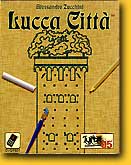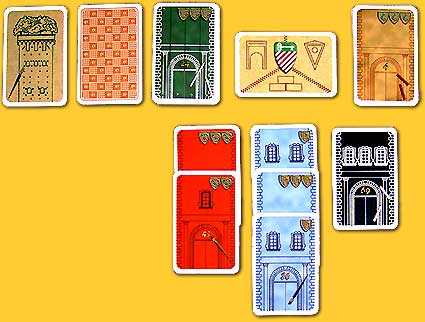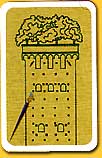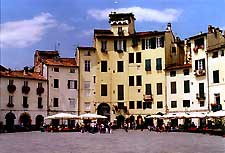Lucca Città
Author: Alessandro Zucchini
Publisher: daVinci Games / Abacusspiele
Year: 2005
review by

| x |
|
|
|
|
|
|
|
|
|
|
|
|
|
|
|
|
|
|
|
|
|
|
|
|
|
|
|
|
|
|
|
|
|
|
|
|
|
|
|
|
|
|
|
|
|
|
|
|
|
|
 |
Lucca is a nice little town, with a well preserved city wall, a splendid intimate little town square surrounded by old houses, and a tower that, through the ages, has trees growing on top of it. The author has developed a card game that has the building of palaces as a theme and named it after his home town. The three to five players each choose a set of three cards, one more to choose from than participating players, that form the parts of the palaces, and that they play for each colour. Each card depicts windows, shields, and a number. |
| x |
|
|
|
|
|
|
|
|
|
|
|
|
|
|
|
|
|
|
|
|
|
|
|
|
|
|
|
|
|
|
|
|
|
|
|
|
|
|
|
|
|
|
|
|
|
|
|
|
|
|
|
At the start of a game, players choose two from four blindly dealt cards that they simultaneuosly play and put in front of them below a neutral player card. The highest amount of shields on the played card reveals the start player for that and every following round; a stalemate is solved by looking at the house numbers for every palace, where the highest number wins. The starting player has the first pick from the sets of cards. A player is restricted to building one palace of each colour, and every palace is finished by a preset, determined by the amount of the participating players, amount of levels (cards).
|
|
|
| x |
|
|
|
|
|
|
|
|
|
|
|
|
|
|
|
|
|
|
|
|
|
|
|
|
|
|
|
|
|
|
|
|
|
|
|
|
|
|
|
|
|
|
|
|
|
|
|
|
|
|
 |
|
The chosen set of cards has to be played immediately: either enlarge a palace with it, discard it, or flip it over to become a city wall and place it on the ‘finished palaces’ row of the neutral player card. Tower cards are immediately put on the ‘finished palaces’ row and may bring a bonus at games end.
When a palace has the required amount of levels and thus is finished, it gets scored: one point per window. Then the complete stack is moved to the left side of the central player card: the finished palaces side.
|
| x |
|
|
|
|
|
|
|
|
|
|
|
|
|
|
|
|
|
|
|
|
|
|
|
|
|
|
|
|
|
|
|
|
|
|
|
|
|
|
|
|
|
|
|
|
|
|
|
|
|
|
After this it can be moved one more time, to the finished, open palaces side on the right side of the central player card. This move, or rather, opening, may bring addititional points, dependant on the finished palaces or palaces under construction of the same kind other players have.
To qualify for the bonus of the city wall cards by games end they have to be supported by twice as much shields on the palaces under construction cards by that player. If so, they give points per card multiplied by the amount of finished, open palaces. Finally there is a bonus for the house numbers on the cards: three points for the player with the highest number, with a penalty of three minus points for the player with the lowest number on his cards on the finished open palaces row.
|
|
 |
 |
|
|
|
|
|
|
|
|
|
|
|
|
|
|
|
|
|
|
|
|
|
|
|
|
|
|
|
|
|
|
|
|
|
|
|
|
|
|
|
|
|
|
|
|
|
|
This sounds all rather technical, and yes, it is. The artificial shifting of cards does no good for the feel of the game nor the pleasure in playing the game. We had reminiscences of ‘Il Principe’, where we also encountered the same seemingly aimless shifting of cards. ‘Lucca Città’ falls short of building up tension and suffers from the ‘is-it-over-already’ feeling. When reading the rules, the game promises to have more tactical choices than actually can be made once the game gets played. Together with the uninspirational illustrations on the cards this is a missed opportunity. Lucca is a pittoresque town with great atmosphere; it is a pity that we get so little of it in this game.
© 2006 Richard van Vugt
Lucca Città, Alessandro Zucchini, daVinci Games / Abacusspiele, 2005 - 3 to 5 players, 10 years and up, 20 to 30 minutes
|
 |
  |
|
|
|
|
|
|
|
|
|
|
|
|
|
|
|
|
|
|
|
|
|
|
|
|
|
|
|
|
|
|
|
|
|
|
|
|
|
|
|
|
|
|
|
|
|
|
  |
|
|
|
|
|
|
|
|
|
|
|
|
|
|
|
|
|
|
|
|
|
|
|
|
|
|
|
|
|
|
|
|
|
|
|
|
|
|
|
|
|
|
|
|
|
|
  |
|
|
|
|
|
|
|
|
|
|
|
|
|
|
|
|
|
|
|
|
|
|
|
|
|
|
|
|
|
|
|
|
|
|
|
|
|
|
|
|
|
|
|
|
|
|
  |
|
|
|
|
|
|
|
|
|
|
|
|
|
|
|
|
|
|
|
|
|
|
|
|
|
|
|
|
|
|
|
|
|
|
|
|
|
|
|
|
|
|
|
|
|
|
| x |
|
|
|
|
|
|
|
|
|
|
|
|
|
|
|
|
|
|
|
|
|
|
|
|
|
|
|
|
|
|
|
|
|
|
|
|
|
|
|
|
|
|
|
|
|
|
|
|
|
|
| x |
|
|
|
|
|
|
|
|
|
|
|
|
|
|
|
|
|
|
|
|
|
|
|
|
|
|
|
|
|
|
|
|
|
|
|
|
|
|
|
|
|
|
|
|
|
|
|
|
|
|
 |
|
|
|
|
|
|
|
|
|
|
|
|
|
|
|
|
|
|
|
|
|
|
|
|
|
|
|
|
|
|
|
|
|
|
|
|
|
|
|
|
|
|
|
|
|
|
 |
|
|
|
|
|
|
|
|
|
|
|
|
|
|
|
|
|
|
|
|
|
|
|
|
|
|
|
|
|
|
|
|
|
|
|
|
|
|
|
|
|
|
|
|
|
|
| x |
|
|
|
|
|
|
|
|
|
|
|
|
|
|
|
|
|
|
|
|
|
|
|
|
|
|
|
|
|
|
|
|
|
|
|
|
|
|
|
|
|
|
|
|
|
|
|
|
|
|
 |
|
|
|
|
|
|
|
|
|
|
|
|
|
|
|
|
|
|
|
|
|
|
|
|
|
|
|
|
|
|
|
|
|
|
|
|
|
|
 |
|
|
|
|
|
|
|
|
|
|
|
|
|
|
|
|
|
|
|
|
|
|
|
|
|
|
|
|
|
|
|
|
|
|
|
|
|
|
|
|
|
|
|
|
|
|
|
|
|
|
|
|
|
|
|
|
|
|
|
|
|
|
|
|
|
|
|
|
|
|
|
|
|
|
|
|
|
|
|
|
|
|
|
|
|
|
|
|
|
|
|